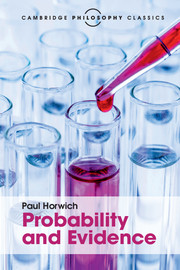Summary
Explications
If your unconditional degree of belief that elephants can fly is lower than your conditional degree of belief relative to the supposition that they have wings, then, at least as far as you are concerned, the information that elephants have wings would count in favour of the view that they are capable of flight. Generalising, we might be inclined towards the following probabilistic account of evidence:
(1) E confirms (supports, is evidence for) H
iff P(H/E) > P(H)
(2) E disconfirms (is evidence against) H
iff P(H/E) < P(H)
(3) E is irrelevant to H
iff P(H/E) = P(H)
But this would be open to a couple of substantial objections. First, it is too subjective. It suggests the conditions in which an individual, given his personal degrees of belief P, would say that E confirms H. But facts about evidence are not simply matters of taste. E may be evidence for H, whatever I may happen to think; and what we want is an account of the circumstances in which this objective fact obtains. Second, as Glymour (1980) has noted, its plausibility is confined to those contexts in which the truth of E is uncertain. When E is known, P(E) = 1 and P(H/E) = P(H). Thus, we would have to deny that established data could ever qualify as evidence; and this is obviously wrong.
Nevertheless, this approach is on the right track, and both difficulties can be avoided by the introduction of suitable revisions. To see what is required it is necessary to acknowledge two things.
- Type
- Chapter
- Information
- Probability and Evidence , pp. 48 - 67Publisher: Cambridge University PressPrint publication year: 2016

